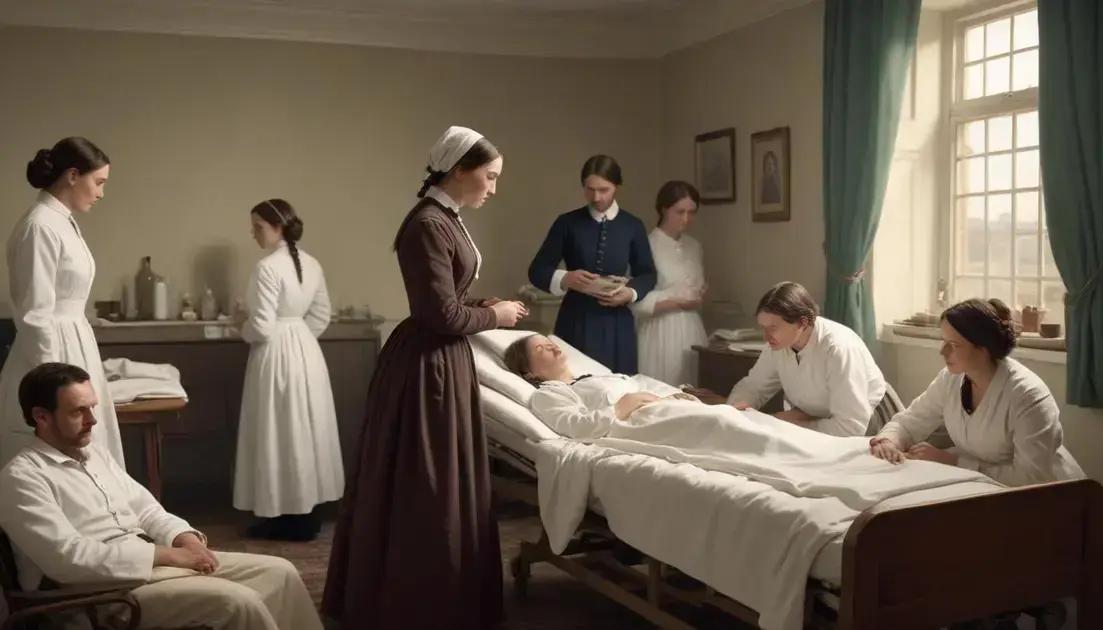
Florence Nightingale: The Woman Who Revolutionized Nursing
Florence Nightingale is recognized as the founder of modern nursing due to her revolutionary contributions during the Crimean War. She established nursing as a respected profession by prioritizing sanitation and education, significantly improving patient care practices. Nightingale founded the first nursing school, raised awareness about the importance of hygiene, and utilized statistical methods to showcase the impact of nursing on health outcomes, leaving a lasting legacy that continues to shape healthcare today.
Nursing has evolved dramatically, largely due to the indomitable spirit and groundbreaking efforts of women like Florence Nightingale. Ready to explore her revolutionary impact?
Early Life and Background
Florence Nightingale was born on May 12, 1820, in Florence, Italy. Her family moved to England when she was a child. Florence came from a wealthy and well-educated family. Even as a young girl, she showed a caring nature. She often cared for sick animals in her neighborhood.
Her family wanted her to marry and live a conventional life. However, Florence felt a calling to help others. At a young age, she decided to become a nurse. This was not a common path for women of her time.
In those days, nursing was not a respected profession. Most nurses were untrained and came from poor backgrounds. But Florence wanted to change that. She believed that nursing should be a science. She worked hard to gain knowledge and experience.
In 1851, she went to the Nightingale Training School for Nurses in London. This was the first training school for nurses. It provided formal education in nursing practices. Florence excelled in her studies and learned how to care for patients properly.
Her experiences in training shaped her views on nursing. She understood the importance of clean and safe environments for patient recovery. Florence would later put these ideas into practice during the Crimean War, changing nursing forever.
Contributions during the Crimean War
Florence Nightingale made significant contributions during the Crimean War, which began in 1853. The conditions for soldiers were terrible. Hospitals were overcrowded, unsanitary, and lacked proper care. Many soldiers suffered from diseases instead of injuries.
When Florence arrived in 1854, she was shocked by what she saw. She quickly set to work. Florence and her team of nurses improved hygiene and sanitation. They cleaned the hospitals and provided proper meals. Florence believed that clean environments could save lives.
She collected data to show how her changes worked. Using simple charts, she demonstrated the drop in death rates. Her efforts helped cut the death rate from 42% to 2% in just months.
Florence also trained nurses who served alongside her. She developed basic training programs. This helped ensure that nurses were prepared to care for the wounded.
Through her leadership and passion, Florence became known as “The Lady with the Lamp.” She would walk through the wards at night, checking on patients. Her dedication inspired many and helped raise the status of nursing.
Her contributions during the Crimean War changed how people viewed nursing. Florence Nightingale became a pioneer in the field, leading reforms that improved healthcare for years to come.
Founding Modern Nursing
Florence Nightingale played a key role in founding modern nursing. She believed nursing should be a respected profession, based on science and education. In 1860, she opened the Nightingale Training School for Nurses in London. This was the first formal nursing school in the world.
The school emphasized both practical skills and theory. Students learned how to care for patients properly. They studied hygiene, anatomy, and nursing practices. This training helped raise the standards of nursing everywhere.
Florence also wrote a book called “Notes on Nursing.” This book explained basic principles of nursing care. It covered topics like sanitation and patient observation. Many of her ideas remain important today.
Through her training program and writings, Florence shaped nursing into a credible profession. Nurses began to be seen as vital members of the healthcare team. Her work inspired many women to join nursing, increasing its popularity.
Florence’s legacy continues today. The nursing profession now requires formal education and training. Thanks to her, nursing is respected and essential in health care systems worldwide.
Legacy and Impact on Healthcare
Florence Nightingale’s legacy and impact on healthcare are immense. She transformed nursing into a respected profession. Thanks to her efforts, nursing is now seen as essential in healthcare systems worldwide.
She introduced strict hygiene practices that saved countless lives. Hospitals adopted her ideas to improve patient care. Her work during the Crimean War highlighted the importance of sanitary conditions.
Florence also laid the groundwork for nursing education. Her training school set a standard for nursing programs everywhere. Today, nursing requires formal education and training based on her model.
Her book, “Notes on Nursing,” remains influential. It taught valuable principles that are still relevant today. Many nurses learn from her work and apply those lessons in their practice.
Moreover, Nightingale’s approach to data collection revolutionized healthcare. She used statistics to improve patient outcomes. Her methods showed how data could inform better healthcare decisions.
Florence Nightingale is often called the founder of modern nursing. Her dedication, skills, and compassion continue to inspire nurses around the world. The healthcare community owes much to her vision and tireless work.
Conclusion
In conclusion, Florence Nightingale’s contributions transformed nursing into a respected and essential profession. Her dedication to improving healthcare practices and patient care has left a lasting impact. By establishing formal nursing education, she set the standard for future generations of nurses.
Nightingale’s emphasis on sanitation and data collection revolutionized how healthcare is delivered. Her legacy continues to inspire nurses today, showing the vital role they play in our health systems. Understanding her story helps us appreciate the importance of compassion and care in nursing. Ultimately, Florence Nightingale’s influence will be felt for many years to come, shaping the future of healthcare around the world.


